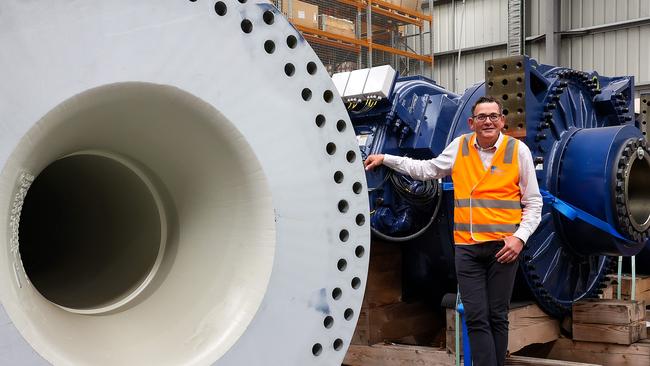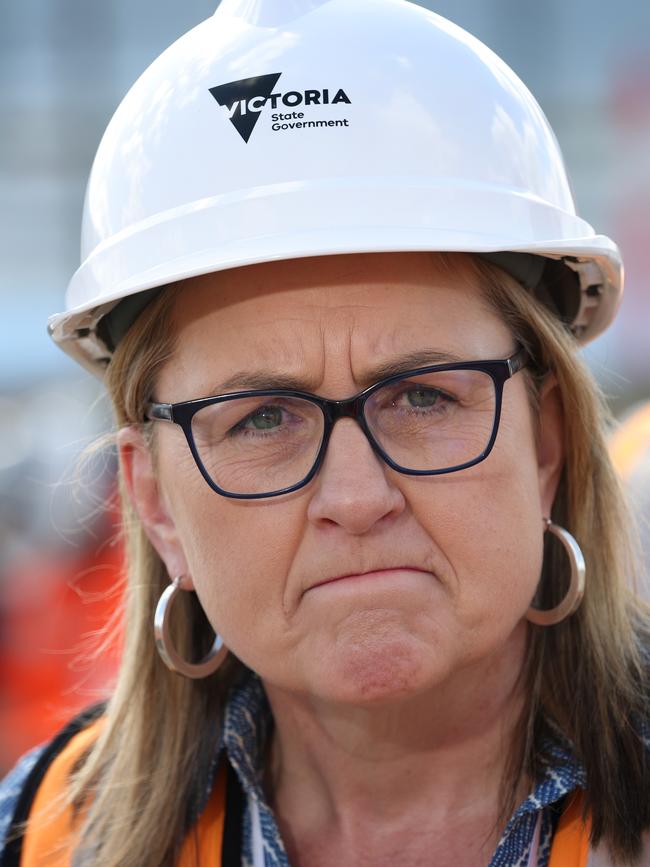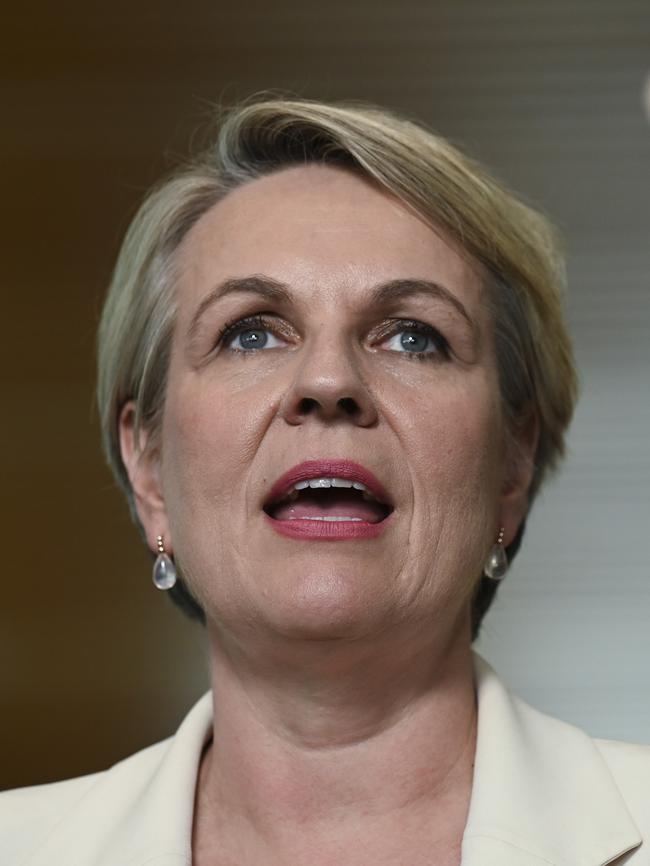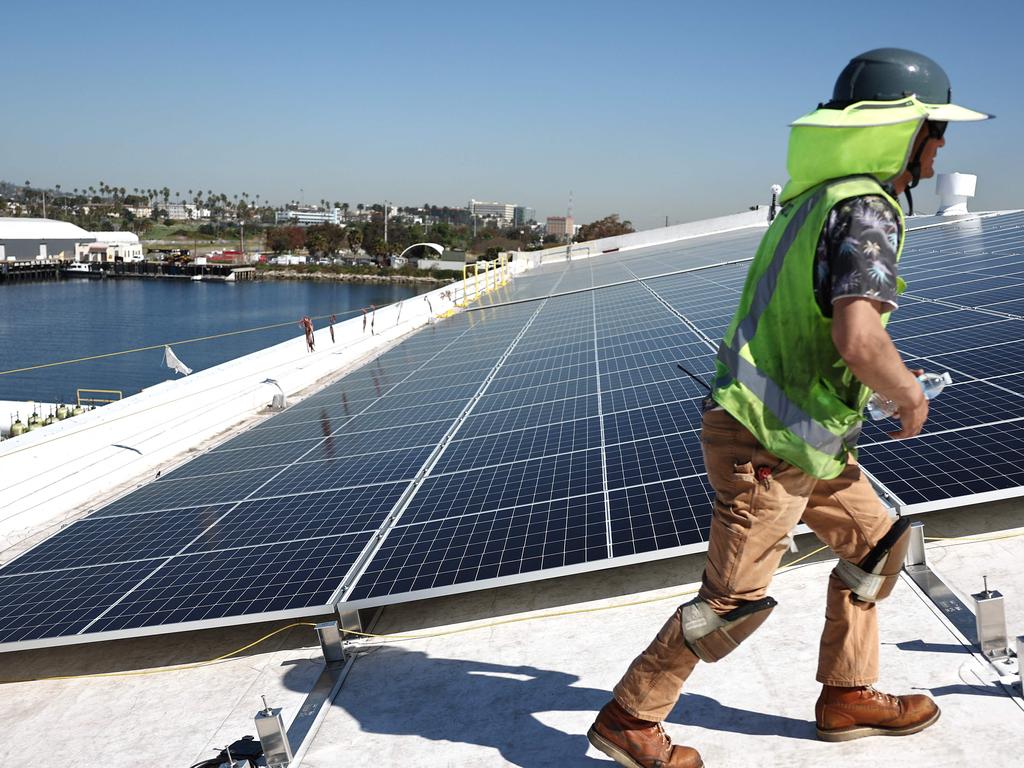Plibersek ruling on Victoria’s offshore wind strategy an ill-wind for ALP energy policy
Labor’s renewable energy target has been thrown into jeopardy after Tanya Plibersek vetoed its lynchpin in Victoria over a ‘clearly unacceptable’ risk to local wetlands.

Labor’s renewable energy target has been thrown into jeopardy after Environment Minister Tanya Plibersek vetoed its lynchpin, Victoria’s offshore wind strategy, over a “clearly unacceptable” risk to local wetlands.
Victorian Premier Jacinta Allan’s green energy plan centres on a terminal at the Port of Hastings, where wind turbines will be assembled together and sent to an array of offshore energy farms. Initial estimates by the state-owned Port of Hastings corporation in October priced the project at $0.8-$1.4bn.
But Ms Plibersek has vetoed its construction, citing “clearly unacceptable” risks to local flora and fauna, sparking angst within industry and government over potentially significant delays to the state’s renewable energy transition.
Industry and government sources on Sunday feared the lack of suitable alternatives to the Hastings site is likely to derail the timeline for the offshore wind farms, leave Victoria dependent on coal for years longer, and ultimately derail the renewable energy targets set by the governments of both Ms Allan and Anthony Albanese.
Despite the state currently depending on brown coal for the majority of its electricity, the Allan government has a target of 95 per cent renewable energy by 2035 – much of which was to be underpinned by offshore wind. Victoria’s plans were also key to the Albanese government reaching its target of 82 per cent renewables by 2030.
In a notification signed by Ms Plibersek on December 18, and published on Friday, the Environment Minister found the plans for a 600m-long, 100m-wide wharf would have “clearly unacceptable impacts” on wetlands “of international importance” at the site off the Mornington Peninsula, southeast of Melbourne.
“The proposed action would have resulted in permanent and irreversible damage to 121 hectares of a declared Ramsar wetland,” Ms Plibersek found.
“It would also have involved dredging up to 92 hectares in the wetland to allow ships to access the wharf.
“In addition to Australia’s international responsibilities to protect the ecological character of the wetland under the Ramsar Convention, the project also presents a threat to the habitat of native species that breed or live in the area, including waterbirds, migratory birds, marine invertebrates and fish.
“The size and nature of the project mean that adverse impacts on the ecological character of the Western Port Ramsar Wetland are unavoidable and cannot be mitigated or offset.”
The Allan government can now either withdraw the project, resubmit a revised version or request the minister reconsider.


A spokeswoman for state Energy Minister Lily D’Ambrosio said Victoria was “proud to be developing Australia’s first offshore wind industry, which will be crucial for delivering national energy security and create thousands of jobs right here in Victoria”.
“The Victorian Renewable Energy Terminal is key to achieving this,” the spokeswoman said.
“We are assessing the commonwealth’s feedback to determine the next steps.”
Opposition environment and acting energy spokesman Jonathon Duniam said the decision represented an “energy debacle”, which would “again leave the grid in further uncertainty”.
“They’re ideologically opposed to … coal and baseload power but can’t get the basics right when it comes to renewables infrastructure,” Senator Duniam said. “Labor still hasn’t worked out how to balance the environment and the economy in their ideologically driven agenda to reach net zero at any cost.
“This decision exposes the fact that Labor set an 82 per cent renewables target without doing its homework on what’s possible.
“The fact the rollout is running at one-10th what it should be proves again you can’t trust Labor to get energy policy right.”
State opposition energy spokesman David Davis said the situation was “a debacle and Victoria’s offshore wind policy is in tatters”.
“How did Victoria, and specifically the Energy Minister, Lily D’Ambrosio, not see this coming? Victoria’s offshore wind policy is now back to first base with extraordinary deadlines to deliver the promised energy integral to targets and promises,” he said.
The project’s veto comes after the state government in 2021 itself halted plans by energy company AGL to build a gas terminal at nearby Cribb Point, based on the impact it would have on the local marine environment.
The proposal to build the Victorian Renewable Energy Terminal, to be run by the state government-owned Port of Hastings Corporation, was announced by then premier Daniel Andrews in October 2022, weeks before Victorians went to the polls. Unveiled as part of the government’s plans to revive the State Electricity Commission, Mr Andrews said the Port of Hastings had been chosen as the “preferred offshore wind construction port”.
Visiting the site in September, Ms D’Ambrosio spruiked offshore wind targets of at least 2GW by 2032, 4GW by 2035 and 9GW by 2040, and would “help us deliver more than 6000 jobs as we work towards net zero by 2045”.
“There is currently no port in Australia that can facilitate large scale offshore wind construction, and this major development from the Labor government will deliver critical, nation-leading enabling infrastructure,” she said
“The Port of Hastings has been selected as the most suitable port to assemble offshore wind infrastructure – with the benefits of large areas of zoned land, it is close to existing port precincts, has deepwater channels and is close to the offshore wind projects off the coast of Gippsland.
“The terminal will undergo a thorough Environment Effects Statement process, allowing the community to make submissions before the project progresses.”
Federal Energy Minister Chris Bowen’s office did not respond to a request for comment.







To join the conversation, please log in. Don't have an account? Register
Join the conversation, you are commenting as Logout